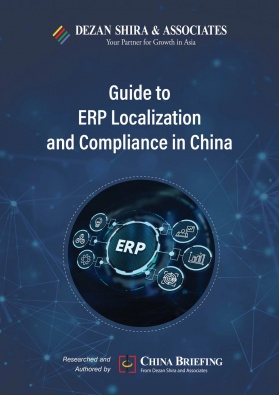New Draft Measures to Further Clarify Implementation of China’s Amended Company Law
The latest set of draft measures from the market regulator seeks to guide the implementation of the amended Company Law in matters related to company registration in China, document filing, registered capital, deregistration of shareholders, and much more. We outline the key provisions proposed in the draft measures.
The State Administration of Market Regulation (SAMR), China’s market regulator, has issued a set of draft implementation measures to accompany the amended Company Law and the recently passed Provisions on the Registered Capital Registration Management System of the PRC Company Law.
The Company Registration Management Implementation Measures (Draft for Comments) (the “draft measures”) provide additional clarity on the establishment, modification, and cancellation of company registration and related record-filing. The draft measures will also apply to foreign-invested enterprises (FIEs).
SAMR is soliciting public feedback on the draft measures until August 26, 2024.
Below we outline some of the key provisions proposed in the draft measures.
New filing and registration requirements
Business license information
The draft measures stipulate that the company’s business license should include the following information:
- Name;
- Domicile;
- Name of the legal representative;
- Registered capital;
- Type;
- Scope of business;
- Registration authority;
- Date of establishment; and
- Unified social credit code.
In addition, the draft measures stipulate that companies with an audit committee must simultaneously record information about the directors serving as members of the audit committee.
One of the changes in the amended Company Law is the provision to allow LLCs and joint-stock companies to establish an audit committee within the board of directors, in which case it would not need to establish a board of supervisors (or appoint any supervisors). The audit committee can be “composed of directors on the board of directors [and] exercise the powers of the board of supervisors”.
Requirements for application of domicile or place of business
When applying for the registration of a domicile or business place, a company should submit proof of the domicile or business place usage. If the existence and ownership or usage rights of the domicile or business place can be verified through inter-departmental data sharing, the registration authority may simplify the requirements and exempt the submission of proof materials.
Deregistration of shareholders in the event of death or removal
The draft regulations clarify that if a company’s shareholders have died, been deregistered, or been removed, leading to the company to be unable to deregister on its own, then successors or investors of the shareholders can handle the deregistration on behalf of the company. They must also indicate the relevant situation in the resolution for deregistration.
Handling closed or dormant companies established before July 1, 2024
The draft measures state that if a company cannot adjust its capital contribution period as required by the Company Law by June 30, 2027 due to certain circumstances, then it will be included in a separate register by the registration authority. The circumstances are:
- Having its business licenses revoked;
- Being ordered to close or being canceled; or
- Being unreachable through its registered address and thus being placed on the abnormal business operations list.
Companies that have been added to the separate register can apply to the registration authority to restore their registration status. The registration authority shall review their application and restore their registration status if they meet the required conditions.
If a company is included in the separate register, the registration authority will no longer count or manage it as a registered company. The registration authority will also replace the company name with its unified social credit code, the 18-digit registration number given to every company, on the National Enterprise Credit Information Publicity System and hide other information.
The draft measures also clarify that a company can only have one unified social credit code. If a company’s registration is canceled or deregistered, the registration authority will permanently retain the unified social credit code to ensure it can be traced in the future.
New requirements for registered capital
Time limit for payment of increase in registered capital
The draft measures stipulate that if an LLC increases its registered capital, then the shareholders must fully pay the increased capital within five years from the date of the registration change. This aligns with the new time limit for payment of initial subscribed capital introduced in the amended Company Law. Meanwhile, a joint-stock company must fully pay the increased capital before registering the change.
Review of registered capital in special circumstances
The draft measures stipulate provisions that will allow the company registration authority to evaluate a company’s business scope, operating conditions, shareholders’ capital contribution capabilities, main projects, asset scale, and other aspects in certain circumstances. This applies only to companies established before July 1, 2024 (the date the amended company came into effect) in the following circumstances:
- The company’s subscribed capital contribution period exceeds 30 years;
- The company’s registered capital exceeds RMB 10 billion; and
- Other situations that violate the principle of authenticity and do not conform to objective common sense.
If a company is found to violate the “principles of authenticity and reasonableness” and has an abnormal capital contribution period or registered capital amount, the registration authority can request it to make timely adjustments.
This provision was previously proposed in the draft version of the Provisions on the Registered Capital Registration Management System of the PRC Company Law but was removed from the final version passed in June.
Registration management of company personnel
Timeframe for removal of company directors, supervisors, or senior management personnel
Article 178 of the amended Company Law stipulates the circumstances in which a person cannot serve as a director, supervisor, or senior manager of a company. These are
- Lack of civil capacity or limited civil capacity;
- Being sentenced to a criminal penalty for corruption, bribery, embezzlement, misappropriation of property or disruption of the socialist market economic order, or being deprived of political rights for a crime, and the term of execution has not expired for five years, and if the person is given a suspended sentence, the period of probation has not expired for two years;
- Being a director or factory director or manager of a company or enterprise undergoing bankruptcy liquidation and bearing personal responsibility for the bankruptcy of the company or enterprise, the period of probation has not expired for three years since the completion of the bankruptcy liquidation of the company or enterprise;
- Being the legal representative of a company or enterprise whose business license has been revoked or ordered to close due to illegal activities and bearing personal responsibility, the period of probation has not expired for three years since the company or enterprise was revoked its business license or ordered to close; and
- Being listed as a dishonest person subject to enforcement by the People’s Court for a large amount of debt that has not been repaid when due.
If the election or appointment of a director, supervisor, or senior management personnel violates any of these provisions, the amended Company Law states that the appointment will be invalid. In addition, if a person serving as a director, supervisor, or senior management personnel falls under one of these circumstances during their term of office, the company must remove them from their positions.
The draft measures further clarify that in either of these circumstances, the company should remove the person from the position within 30 days from the date it becomes aware or should have become aware of the situation.
Removal of company personnel information from registration
The draft measures introduce a new system for the removal of information on terminated company legal representatives, directors, supervisors, or senior managers from the public registration records. Under this system, the removal of this information must also be published in the National Enterprise Credit Information Publicity System.
Previously, although the Company Law required companies to remove relevant personnel from their positions should they become ineligible to serve, it did not have clear provisions for dealing with the registration matters related to these company management personnel.
Due to this, companies often did not actively fulfill the obligation of removing relevant personnel from the company registrations, leading to frequent legal disputes where the affected personnel would have to sue the company to have their information removed or updated in the registration records, according to Professor Li Jianwei at the China University of Political Science and Law. The lack of clear provisions in the Company Law also leads to significant disputes in the practical implementation of such removals. Courts and registration authorities across different regions have not formed a consistent approach, resulting in varied judicial opinions and reasons for judgments, which has led to inconsistent practices.
Article 20 of the draft measures aims to resolve these issues by stipulating that if a company fails to comply with the effective legal documents specifying the removal of internal personnel, the court will send an enforcement notice to the company registration authority. The registration authority is then required to assist in the enforcement by removing the relevant personnel’s information from the registration records and publicizing this removal on the National Enterprise Credit Information Publicity System.
This provision effectively resolves the issue of coordination between trial and enforcement after the relevant civil judgment takes effect.
About Us
China Briefing is one of five regional Asia Briefing publications, supported by Dezan Shira & Associates. For a complimentary subscription to China Briefing’s content products, please click here.
Dezan Shira & Associates assists foreign investors into China and has done so since 1992 through offices in Beijing, Tianjin, Dalian, Qingdao, Shanghai, Hangzhou, Ningbo, Suzhou, Guangzhou, Haikou, Zhongshan, Shenzhen, and Hong Kong. We also have offices in Vietnam, Indonesia, Singapore, United States, Germany, Italy, India, and Dubai (UAE) and partner firms assisting foreign investors in The Philippines, Malaysia, Thailand, Bangladesh, and Australia. For assistance in China, please contact the firm at china@dezshira.com or visit our website at www.dezshira.com.
- Previous Article China’s 72/144-Hour Visa-Free Transit Policy Expanded To 54 Countries, Norway Added
- Next Article China Joint Venture: 7 Considerations to Reach a Successful JV Agreement




























